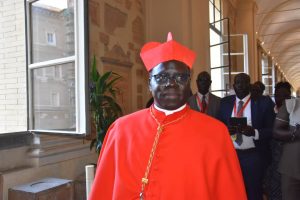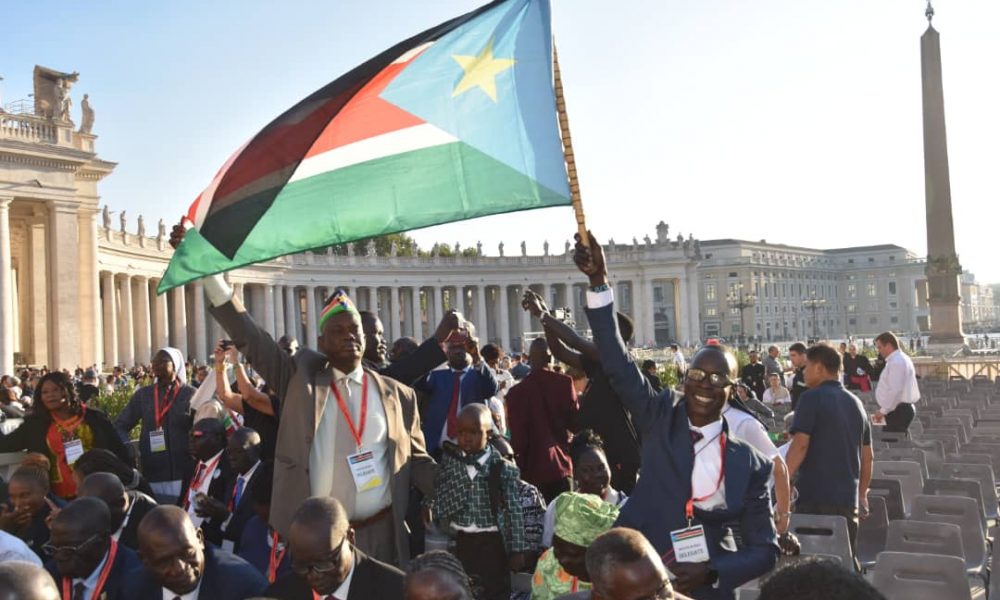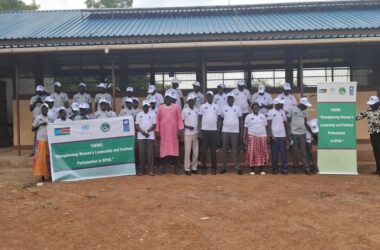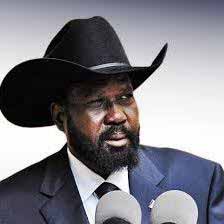By Bida Elly David and Charles K Mark/Vatican News
South Sudan pilgrims to St. Peter’s Square will live to recall 30th September for witnessing the country’s flag flying high at Vatican City, in Rome.
In a distant land, numbers do not count but visibility amidst a sea of a mammoth crowd from all over the World, which the handful South Sudanese outwitted.
By standing ovation and waving of the national flag, the presence of South Sudan became noticeable when Pope Francis pronounced Stephen Ameyu Martin Mulla, as a Cardinal.
Stephen Ameyu Martin Mulla is one of the 21 bishops that Pope Francis named on 9th July 2023 at a consistory for creation of Cardinals. He is also among three African Bishops who have been made cardinals on 30th September, occasion.
Cardinal Stephen Ameyu Martin Mulla, a born of 10 January 1964 hails from Torit County of Eastern Equatoria of South Sudan.
He received priestly ordination on 21 April 1991 as a diocesan priest of the Catholic diocese of Torit.
After his pastoral work in Khartoum, he pursued a doctorate at the Pontifical Urban University from 1993 to 1997, for award of doctorate in dogmatic theology.
The title of his thesis was Toward Religious Dialogue and Reconciliation in Sudan.
He then taught at the seminary of Juba, South Sudan, eventually becoming its rector.
Pope Francis appointed Stephen Ameyu Martin Mulla, Bishop of Catholic Diocese of Torit on 3 January 2019. The diocese had fallen vacant for 5 years since March 2013, following the death of Bishop, Johnson Akio Mutek.
On 12 December 2019, Pope Francis appointed Stephen Ameyu Martin Mulla, as archbishop of Juba and 22nd March 2020 marked his installation.
As Ameyu remained Apostolic Administrator for the Catholic Diocese of Torit, from 21 September 2020 to 24 January 2021, he exercised the same pastoral service to the Catholic Diocese of Wau.

Rejected by man; crowned by God

Ameyu’s journey has not been that smooth, full of spikes and stones, following letters of protest sent to Vatican against his appointment as Archbishop of Juba.
A scriptural verse that says, the rejected stone becomes a corner stone has come to pass in the crowning of Cardinal Stephen Ameyu Martin Mulla.
Had God considered rumor mongers and human directives, Ameyu would have ceased to be even a priest, as allegations against him are unpalatable.
One letter, dated 12 December 2019, was signed by three priests and five laymen, who identified themselves as “community elders.”
The letter gave three reasons for opposing the appointment, charging that government officials and some Juba priests had conspired to promote Ameyu as archbishop for personal interests, and had influenced a Vatican diplomat to that end; that a local priest could have been appointed; alleging that Ameyu has fathered at least six children.
The letter said that Ameyu “will not be accepted to serve as Archbishop of Juba under any circumstance.”
The letter writers said that they are “a generous and hospitable people … kindhearted and straightforward people who do not tolerate any form of humiliation. We take long to react but once the gloves come off, it becomes difficult to calm things later.”
They maintained that their opposition “should not be misinterpreted as tribalism,” saying they have “no objection in having a bishop from outside the Archdiocese,” and noting that most of their bishops have not been indigenous.
“Therefore, it should be the question of being Bari or none [sic] Bari, but rather appointing a good priest with right qualifications,” they wrote.
In the letter, the protesters added that they are “not questioning or interfering with the prerogative of the Holy Father to appoint bishops,” but are “only against the manipulation and the buying of the process by politicians and other interest groups.
“We are against a person brought from outside just to promote personal interests while maliciously leaving out the qualified sons of this land,” they wrote.
The letter “sparked a lot of reactions in the social media with many negative references labeling the Bari Community as tribalistic community just because those who appended their signatures to the letter happen to come from the Bari tribe.
However, Bari community leaders distanced themselves from critics opposed to Ameyu’s appointment as Archbishop of Juba.
According to the leaders, those who opposed the appointment and wrote a letter were individuals who did not represent the Bari community.
“Those indigenous clergy and faithful Bari who have rejected the appointment of the new Archbishop for Juba [do] not reflect the position of the entire Bari Community or their association i.e. the Bari Community Association,” Cornelio Bepo Lado Kenyi, chairman of the Juba-based association, explained.
The statement adds that critics of the Archbishop Stephen Ameyu “have not been mandated by the community nor the association.”
“To be clear, they have neither sought the opinion of the Bari on the subject under reference nor have they (been) delegated to do so,” the Baric Community Association’s statement said.
“No Bari will speak on behalf of the Bari Community except when mandated by its leadership and as guided by the BC Constitution,” the statement added.
The protesters might have been piqued by the curious manifestation of Jesus parable in the gospel of his disciple Mark, of the rejected stone becoming the cornerstone.
Scriptural manifestation
As Jesus asked his disciples, “have you not read this Scripture: the stone that the builders rejected has become the cornerstone; this was the Lord’s doing, and it is marvelous in our eyes’?”Mark 12:10-11.
The above scripture unveils itself in the country, as despite the protest letters, the Bishops’ conference, on Dec. 19, issued a statement supporting the appointment of Rev. Stephen Martin Ameyu Mulla to succeed Archbishop Paolino Lukudu Loro.
On his ways, unknown to man, God, who works through his chosen disciples did not only unveil Stephen Martin Ameyu Mulla as the Archbishop of Juba but continued to lift him of Cardinal.
“For my thoughts are not your thoughts, nor are your ways my ways,” says the Lord. For as the heavens are higher than the earth, so are my ways higher than your ways, and my thoughts than your thoughts” Isaiah 55:8-9.
On 9th July, 2023 Pope Francis named Archbishop Ameyu among 21 bishops to become Cardinals and last Saturday, 30th September, the rejected stone was crowned.
Those opposing the ways of God need to be reminded that there’s a way that we are prone to think that is so different from the way God is prone to think.
Even the homily by Pope Francis, during the consistory attested to the mind Christ in the new cardinal of South Sudan, considering the challenging situation he encounters in the calling.
Pope Francis: Diversity in one Catholic Church
In his homily addressed to the College of Cardinals and its new members (including 19 archbishops and bishops, and two priests), the Pope reflected on the reading from the Acts on the story of the Pentecost, in which the Apostles were filled with the Holy Spirit and experienced the gift of tongues as they preached the Gospel to Jews of different nationalities in Jerusalem (Acts 2, 1-11).
He drew attention to the similarity between all those Jews of different nationalities and languages who heard the Apostles preaching to them and the Bishops and Cardinals of our time hailing “from all parts of the world, from the most diverse nations”.
This, Pope Francis noted, offers a different perspective from that which traditionally identifies the pastors of the Church with the Apostles: that of those peoples of Jerusalem who received the Kerygma, the proclamation of the mystery of salvation, and in welcoming it, (…) became part of the Church (…) who speaks all languages, is One and is Catholic”.
The gift of being evangelized in our own language
He therefore pointed out that before being “apostles”, before being priests, Bishops, Cardinals, pastors should remember that they are “Parthians, Medes, Elamites etc.” like those converted Jews, and should be grateful “for having received the grace of the Gospel in their own language through their grandparents and parents, catechists, priests, and religious”.
“Indeed – he said – we are evangelizers to the extent we cherish in our hearts the wonder and gratitude of having been evangelized, even of being evangelized, because this is really a gift always present that must be continually renewed in our memories and in faith.”
“In the ‘flesh’ of our people, the Holy Spirit has worked the wonder of communicating the mystery of Jesus Christ who died and rose again. And this came to us ‘in our language’ (…). The faith is transmitted ‘in dialect’ by mothers and grandmothers.”
Remarking that “the Pentecost is not a thing of the past”, but” a creative act that God continually renews”, and that “the Church, and every baptized member, lives the today of God, through the action of the Holy Spirit”, Pope Francis reminded the Cardinals receiving the biretta today that their new role renews in them their “vocation and mission in and for the Church”.
Working for an ever more symphonic and synodal Church
He clarified this mission with the image of the orchestra which embodies simultaneous diversity and unity “representing the harmony and synodality of the Church”.
“Diversity is necessary; it is indispensable. However, each sound must contribute to the common design. This is why mutual listening is essential”, the Pope said, adding that the conductor of the orchestra is called to help “each person and the whole orchestra develop the greatest creative fidelity”.
Hence the call to the College of Cardinals to work for “an ever more symphonic and synodal Church” confiding in the Holy Spirit who “creates variety and unity and “is harmony itself.”
“We entrust ourselves to his gentle and strong guidance, and to the gracious care of the Virgin Mary,” Pope Francis concluded.



